Birth
General Secretary of the PSOE
1942-1974
1974-1982
General Secretary of the PSOE
President of the Government
President of the Government
1982-1996
1996-2004
Expresident and parlamentarias
Ex-parlamentarian
2004-The Present
1942
1974
Birth
General Secretary of the PSOE
“Socialism may be defined
in broad terms as
the extension of the concept
of democracy”.
Felipe González was born on the 5th of March 1942 in the district of Bellavista in Seville (Spain). The son of the cattle dealer Felipe González Helguera and Juana Márquez Domínguez, he was the second of four siblings.
Secondary education (Bachillerato) took place at the Padres Claretianos college and pre-university studies at the San Isidro Institute. Subsequently he studied Law at the University of Seville, graduating in 1965 before attending the preparatory year for a degree in economics at the Catholic University of Louvain in Belgium.
While an undergraduate he collaborated with the Catholic Action University Youth Movement as well as the Catholic Worker Youth. In 1962 he joined the Socialist Youth just as it was undergoing clandestine reorganization in Andalusia. Two years later he joined the ranks of the Spanish Socialist Workers´ Party (PSOE) and the following year had been elected part of the provincial committee for the party which was still a banned organization in Spain as it had been since the end of the Spanish Civil War in 1939 and whose leadership was based in exile overseas. His activities were therefore by necessity underground so that in 1971 his participation in demonstrations against the government of General Franco led to his being arrested by the police.
Following his graduation in law he opened a legal practice which specialised in labour conflicts which helped in his getting to know at first hand the difficulties of the working class during the years of economic development under Franco´s dictatorship. From his legal practice he aided in the formation of the UGT (General Workers´ Union – Socialist Party Trade Union Organisation) in the capital and in the smaller towns of Seville province.
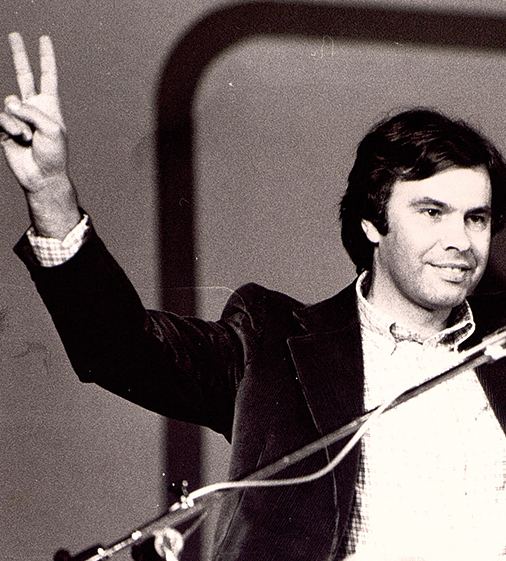
In 1969 he married his first wife Carmen Romero López, a secondary school teacher and socialist party activist and trade unionist member of the UGT, in Seville and with whom he would father three children: Pablo (1972), David (1973) and María (1978).
González joined the Provincial Committee of the PSOE in Seville in 1965 and in 1969 joined the National Committee before being elected a member of the Executive Committee in 1970. During those years he initiated a movement for renewal of the socialist party ranks. In August 1972 and representing the Executive Committee of the Interior (PSOE Renovated) which fought against the Exterior Executive (Historic PSOE made up of the veterans in exile and headed by the General Secretary since 1944, Rodolfo Lopis), participated in the 25th Congress of the party which was held in Toulouse in France. Two years later, in October 1974, the 26th Congress which was also held in France, in Suresnes, elected him General Secretary, a post which had been open since the previous congress due to internal splits.
1974
1982
General Secretary of the PSOE
President of the Government
“A political leader needs to make sure that dreams and wishes – especially those of the younger generation – find a place in representative democracy which is expressed at the ballot-box”.
Felipe González – known to his political friends as Isidoro – was still 32 years old and also enjoyed the support of major figures in European Social Democracy including the Italian Pietro Nenni, the Swede Olof Palme and the German Willy Brandt who all supported his position in the Socialist International for recognition of PSOE Renewal as the true representative of Spanish socialism.
Following the demise of General Franco in November 1975 and now living in Madrid with his family, he know headed part of the opposition in Spain at the head of the Democratic Convergence Platform which merged with the Democratic Council in March 1976 which was supported by the Spanish Communist Party (PCE) and resulting in the Democratic Coordination which was also known as the Platajunta.
At the 27th Socialist Party Congress in December 1976 in Madrid which was the first to be held inside Spain since the end of the Civil War, González was confirmed as General Secretary.
In February 1977 the PSOE was made legal by the government of Adolfo Suárez by which Felipe González was able to take part in the first constituent democratic general elections on the 15th of June the same year. The PSOE obtained 29.2% of the popular vote and 118 seats to become the second biggest group in Parliament and easily beating the Communist Party (9.3% of the vote and 19 seats).
At the 28th Congress on the 17th of May 1979 González made a transformational motion which was defeated. As a result he resigned and an interim committee took over the running of the party although at an extraordinary congress held in September of the same year the General Secretary received 86% of votes and as a result also saw his proposal to renounce Marxism in favour of the reformism of social democracy confirmed which sought to turn the PSOE into a modern and multi-class party as in much of the rest of Europe. From the 7th of November 1978 he held the post of Vice-president of the Socialist International and began to collaborate closely with its leader – the former German Chancellor, Willy Brandt.
“Progressive political action comprises
of the ability to articulate effective
responses which are both jointly
and supportively made through dialogue,
through agreement and through participation”.
In the legislative elections of the 1st of March 1979 (the 1st Parliament), the PSOE consolidated its position as an alternative for government with 30.5% of the popular vote and 121 seats. In the municipal elections that same year on the 3rd of April, the progressive increase in support for the Socialist Party resulted in the PSOE winning in over a thousand municipalities and its governing many of Spain´s major cities.
1982
1996
President of the Government
The growing crisis in the UCD and the attempted coup d´état on the 23rd of February 1981 showed the urgent desire for political change on the part of public opinion. General elections were called for the 28th of October 1982 where the PSOE achieved overwhelming victory with 48.3% of the popular vote and 202 seats in parliament, the first absolute majority by any party. Never before had a party of the left received so many votes in Spain and is still the best result for any political organization since the democratic period begun under the 1978 Constitution.
On the 2nd of December 1982 Felipe González was inaugurated President of the first Socialist Government in the history of Spain with 207 votes in his favor, 116 against and 21 abstentions (2nd Parliament).
Under the PSOE slogan ´Por el Cambio` (For Change) which was used during the election campaign, the arrival in government of the socialists encouraged hopes for change and transformation at all levels and across all sectors in a nation where considerable underdevelopment was clear in comparison with the established Western European democracies.
In this first parliament with a wide range of executive decisions and legislative innovations, the socialists applied a policy aimed on the one hand to strengthening and extending democracy while on the other pushing a series of major reforms which lead these years to be known as the ´decade of change` and encouraged a climate of confidence on the part of the population in state institutions.
In the social field Spain began to experience clear progress through the setting up of a Welfare State. Basic education was modernized on the one hand by means of the Ley Orgánica de derecho a la Educación (LODE – Right to Education Law) of July 1985 followed in October 1990 during the third parliament by the Ley Orgánica de Ordenación General del Sistema Educativo (LOGSE – Law for Ordering the Education System) which restructured secondary education and provided for universal and free public education up to the age of 16. On the other hand, a comprehensive social security system was instituted which was supported by the contributions of its members. The Ley General de la Sanidad (1986 – National Health System) governed the operation of the National Health System which provided public health cover which was free of charge and universal and of high quality. This new framework transformed public health in Spain with the provision of cover ceasing to be dependent on the contributions of the employee, no longer being seen as social insurance but rather as a universal right for all citizens. In addition, the Ley Orgánica 9/1985 reforming the penal code, legalized abortion and carried out the delicate task of reforming and professionalizing the Armed Forces which was known as the ´military transition`.
In the economic field the government unleashed structural reforms for the manufacturing sector which it viewed as essential for the modernization of the nation. The most visible part of this process was the updating of industries such as steel, ship building and the pharmaceutical industries.
Socialist governments were characterized by their economic pragmatism combined with an active social policy which gave them the confidence of the employers without ignoring the trade union movement with which an Economic and Social Pact was signed in 1984 although later on some four general strikes were called (1985, 1988, 1992 – this one for half a day – and 1994: against pension reform, against the youth employment programme and the government´s economic policy, against employment reform and against reform of unemployment benefits, respectively).
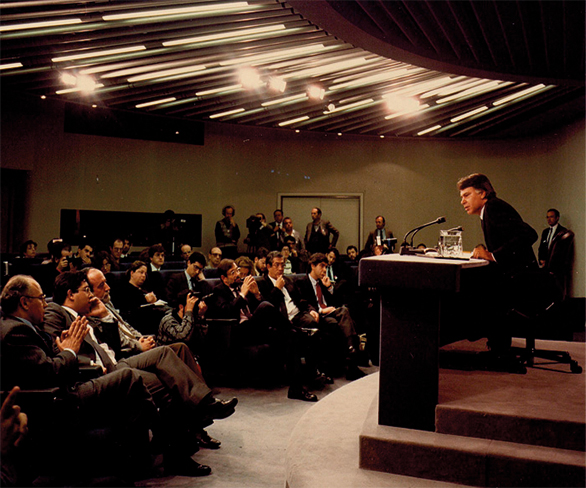
During the latter years the state business sector underwent a process of management rationalisation with a view to the modernization of national manufacturing industry and the competitiveness of national manufacturing industry which assumed the highly competitive business mentality of the European Common Market and which stressed the efficiency of public holdings which were responsible for the management of the companies.
In international relations the governments led by Felipe González served as a definitive opening up towards the world which began during the first democratic governments. González´ internationalist strategy found its definitive expression in membership of Euro-Atlanticist structures and a rejection of unilateralism and non-alignment.
On the 20th of June 1983 González made an official visit to Washington where he was received by the president Ronald Reagan who described González in his journal as ´a sharp, brilliant with personality, youthful, moderate and pragmatic socialist`. Excellent communications and a desire for mutual understanding were the leitmotiv of further meetings with the U.S. president in 1985, the first taking place in Madrid in May and the second in September in Washington.
In fulfilment of his electoral promises González called a referendum for the 12th of March 1986 on membership of NATO. Although the result was not binding and was only for guidance, the referendum ran the risk of becoming a plebiscite on the performance of the government; if González were to lose, with general elections just around the corner, his situation would be compromised. In addition a change in the attitude of the government towards NATO had also taken place as the PSOE had opposed the organization before forming a government. The commitment of the president proved decisive for turning public opinion around which approved remaining in NATO in the conditions set by the government. Membership of NATO was approved by 52.5% of votes.
Just three months later, on the 22nd of June 1986, elections were held with positive results for the PSOE which won 44.1% of the votes and 184 seats in parliament and formed a government with an absolute majority for a 3rd Parliament.
The cornerstone of PSOE foreign policy was membership of the European Community which was an aim that had been pursued by all Spanish governments since 1962 although this only became a priority after the elimination of the reticence and mistrust of the nationalism of the Franco regime and the official request made by Adolfo Suárez in 1977. For the democratic governments it became indispensable to overcome the secular marginalization of Spain in the European political and economic project.
On the 12th of June 1985 and after six years of arduous and tortuous negotiations in which Madrid had to embrace the jurisdiction of the Council of Europe, adapt the industrial structures subject to protectionist policies and overcome French opposition to the competition represented by the potent Spanish agricultural industry, González signed the Act for Accession to the European Economic Community (EEC), the European Coal and Steel Community (ECSC) and the European Atomic Energy Community (EURATOM) at the Palacio Real in Madrid. Formal entry into the European Community took place on the 1st of January 1986 along with neighbouring Portugal.
On the 29th of October 1989, seven years after first taking power, elections were held which were again won by the PSOE with 39.6% of the vote and 175 parliamentary seats (4th Parliament).
Between the first presidency of the council in the first half of 1989 and the second in the second half of 1995, the weight of Spain and the influence of González in the new European Union (from November 1993) were in line with his commitment to the most Europhile theories. In May 1993 González was awarded the Charlemagne Prize in the German city of Aachen for his contribution to European unity. González was the third Spanish national to receive this prestigious award after the philosopher and diplomat Salvador de Madariaga in 1973 and King Juan Carlos in 1982. In 1994 European authorities seriously considered the Spanish socialist Felipe González as the replacement for Jacques Delors at the head of the European Commission although this possibility was later dropped confounding those who believed that he would not fail to take advantage of an opportunity to leave government and enter Europe politics at the highest level.
“Electoral promises should be fulfilled and where circumstances prevent this or result in a change in opinion, you are obliged to explain the reason honestly without looking for others to blame thus avoiding any feelings of disillusion which predominate in Spanish politics”.
The relaunching of Spain´s diplomatic relations over the 14 years of socialist government far exceeded the Euro-Atlanticist context. Spain had become a country which inspired the confidence of the Arab countries as well as that of Israel, being a nation which could act as an intercultural bridge having in the past been multi-faith as well as the site of Arab and Jewish coexistence. In fact it was the González government which in January 1986 re-established diplomatic relations with Israel by recognizing its statehood. This unique duality was recognized with the choice of Madrid as host of the historic conference which, under the aegis of the Unites States of America and with joint sponsorship from the Soviet Union, was the beginning of the Middle East Peace Process. This important event was held in the Palacio Real in Madrid between the 30th of October and the 1st of November 1991 and was attended by Israeli, Palestinian, Jordanian, Egyptian, Syrian and Lebanese delegations along with its joint sponsors, Presidents Bush and Gorbachev.
In Latin America, Spain was closely involved in the Central American peace process following the creation of the Contadora Group and its Support group. Between 1989 and 1991 González was part of the group of ´friendly presidents` which provided its good offices towards the positive results of the peace process in El Salvador. In January 1992 González, as a witness at the ceremony, played a distinguished part in the signing at Chapultepec in Mexico of the Peace Accords by President Alfredo Cristiani and the representatives of the FMLN guerrilla movement which brought 12 years of civil war to an end.
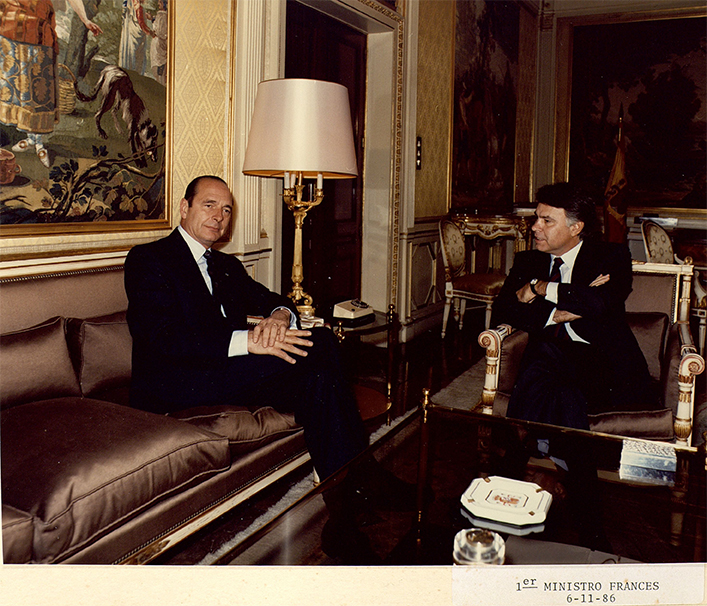
Meanwhile, the political and cultural links between Spain and the Latin American sub-continent reached a multi-lateral dimension with the series of Ibero-American Summits, the second of which took place in Madrid on the 23rd of July 1992, the Fifth Anniversary of the arrival of Columbus in the Americas. The cordial personal relations and the ideological affinity within the Socialist International between Felipe González and the Social Democratic Presidents of Venezuela – Carlos Andrés Pérez, Peru – Alan García Pérez, Bolivia – Jaime Paz Zamora and Brazil – Fernando Henrique Cardoso, sidelining the Radical Argentine – Raúl Alfonsín and the Uruguayan Colorado – Julio María Sanguinetti, were key to the increased presence and influence of Spain.
It should not be forgotten that 1992 was the year of major festivities and celebrations of the Olympic Games in Barcelona, the World Expo in Seville and the Fifth Centenary of the arrival of Colombus in America, all of which were an enormous success and placed Spain among the small circle of nations with a reputation for reliability and for modernity. In a very direct manner they were also the driving force for the modernization of the infrastructure of these two cities, although it was also to the benefit of Spain as a whole with the introduction of the AVE High Speed Train service which connected Madrid and Seville and was the beginning of the rail transport revolution.
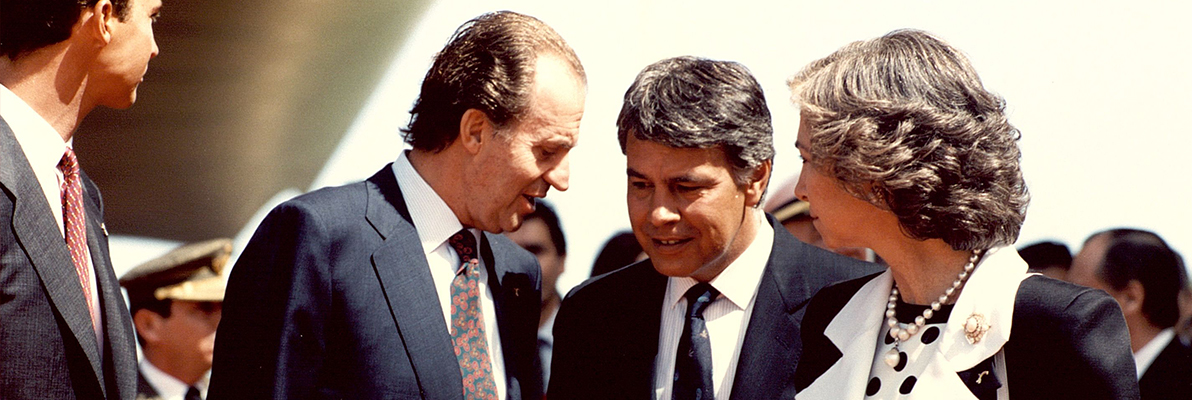
On the 6th of June 1993 general elections were held early and gave the PSOE a simple majority for the first time since 1982 with 38.8% of votes and 159 parliamentary seats and which required the search for parliamentary support from the moderate nationalist parties governing Catalonia (CiU) and the Basque Country (PNV) to ensure Spain´s governability in this 5th Parliament.
In December 1995, in the final stretch of his mandate and completing the six-month Spanish presidency of the EU Council, Spain´s foreign policy activism reached a high point. On the 3rd Madrid was witness to the signing of the New Transatlantic Agenda with The United States of America alongside President Bill Clinton and the President of the European Commission, Jacques Santer. On the 15th and 16th the agreement for the launch of the Euro as the future European currency was signed by the Council of Europe and on the 15th the Interregional Framework Agreement between the European Community and Mercosur was signed by the respective foreign ministers. Shortly before, on the 27th and 28th of November, Barcelona had been host to the 1st Euro-Mediterranean Conference (CEM) which gave birth to the Euro-Mediterranean Partnership and the launch of the Barcelona Process.
On the 14th of December 1995, while still President of the Council of Europe, Felipe González represented the European Union in the signing in Paris of the General Peace Agreement for Bosnia – Herzegovina which had been adopted the previous month in Dayton in the United States by the three ex-Yugoslav presidents involved in the conflict, for Bosnia Alija Izetbegovic, for Serbia Slobodan Milosevic and for Croatia Franjo Tudman, the principal actors at the event. The Spanish President shared with the French President Jacques Chirac, President Clinton, Chancellor Kohl, the British Prime Minister John Major and the Russian Prime Minister Viktor Chernomyrdin, the witnessing of the signing as guarantors.
1996
2004
Ex-president and parliamentarian
“European unity cannot only be built inwards but rather also toward the outside of Europe. The historic existence of Europe comprises to be precise in looking outward to the greater world community”.
On the 3rd of March 1996 elections were held for the 6th Parliament with Felipe González as candidate for the 7th successive campaign. After four parliaments and thirteen and a half years as President of the Government the PSOE lost the elections with 37.6% of the vote and 141 seats, his mandate ending in May 1996.
There can be no doubt that the economic crisis, discontent with certain of the measures adopted, weariness after so many years in government and the generalised dissatisfaction with the scandals and cases of corruption (including Filesa, Ibercorp, the Juan Guerra or Luis Roldán cases, the dirty war against ETA, among others) with various ministerial resignations, not only produced a serious confrontation with the opposition but also undermined the confidence of the electorate in the PSOE and its government, resulting in a major electoral defeat.
Henceforth and as ex-president, Felipe González was active in both Europe and in Latin America where he participated in seminars and conferences which at that time were focused on the analysis of the phenomenon of globalization and its challenges.
In December 1996 González lead the OSCE team in Belgrade which investigated the irregularities claimed in the Serbian municipal elections as well as mediating between the government of Milosevic and the democratic opposition. Subsequently, in March 1998 the Contact Group for Kosovo nominated González as the envoy for the OSCE (as the personal representative of its acting Chair, the Polish Foreign Minister Bronislav Geremek) and the European Union (as special representative of the Council which approved his appointment in June under the United Kingdom presidency) to mediate in the conflict affecting the Albanian majority province ruled by Serbia although the former Spanish President was unable to fulfill his mission due to the Belgrade authorities refusing to accept the appointment.
On the 20th of June 1997 González resigned as General Secretary of the PSOE at the opening of its 34th Congress. In the 2000 elections for the 7th Parliament he would return to parliament not representing Madrid but rather Seville. This was to be his final parliament as he would not be a candidate in the 14th of March 2004 elections. Although no longer having a seat in parliament nor holding any posts within the party, he has never cut his ties to the party and has collaborated with its management committees whenever requested to do so.
At the end of 1998 the 1994 situation with Delors was repeated as the date for the replacement of Jacques Santer as President of the European Commission approached. In spite of his being nominated by the Socialist Government of Portugal and by Delors himself, González declined to become involved in the candidature process alleging that he did not want to occupy any institutional posts.
In 1999 he resigned from the Vice-Presidency of the Socialist International which he had held since 1978 although only after being appointed to take charge of the Committee on Global Progress with the mission of drafting a new manifesto setting out the Social Democrat response to the phenomenon of globalization. Seen as a synthesis of the Third Way expounded by Tony Blair and the more traditional Socialism of France´s Leonel Jospin, the text served as the basis for the Declaration which closed the 21st Congress of the Socialist International held in Paris in November 1999. Following up the previous commission, the Global Progress Foundation was also founded which González presided over until 2009.
In October 2001 following the impact of the 9/11 attacks, Felipe González was one of the 35 world leaders – both active and retired – who took part in Madrid in the Conference on Democratic Transition and Consolidation (CTCD) which was inaugurated by Mikhail Gorbachev. As a result, in May 2002 the Madrid Club emerged as an extensive framework for meetings between well-known retired world leaders.
2004
The Present
Ex-parliamentarian
As a former president González was entitled to join the Council of State for life but waived the opportunity. The King Juan Carlos offered him a title as had been offered to Adolfo Suárez who was made a duke but González declined the opportunity on grounds of personal and political principles.
Removed from Spanish political life González continued to involve himself in an intense international schedule. In 2005 he mediated discreetly between the Colombian government of Álvaro Uribe and the guerrillas of the National Liberation Army (ELN) with the aim of advancing peace accords which failed. In 2006 González provided similar mediation between the governments of Iran and the United States of America aimed at drawing the parties closer in terms of Iran´s nuclear programme.
On the 27th of July 2007 the government of José Luis Rodríguez Zapatero, at the suggestion of the Foreign Minister Miguel Ángel Moratinos appointed González as Extraordinary Ambassador and Plenipotentiary for the Bicentenaries of the Independence of the Ibero-American Republics.
On the 14th of December 2007 the Heads of State and Government of the European Union meeting at the Council of Europe in Brussels nominated their retired Spanish colleague as president of the Group for Reflection on the Future of Europe, also known as the Committee of the Wise. Comprised of nine personalities of recognized political, business and academic prestige (in October 2008 the Council of Europe increased the number of members to twelve), the Group for Reflection was formed with the mission to study and propose responses to the challenges which the European Union will face in the longer term and in particular with the horizon of the decade 2020 – 2030.
In February of 2009 González went on to form part of the new International and Cooperation Policy Council of the PSOE which was conceived of as a support for the Foreign Ministry.
Between December 2009 and December 2012 González acted as President of the Doñana Nature Reserve Participation Council, a collegiate body for consultation and decision-making purposes subject to the Andalusian Regional Government´s Environment and Development body.
Since December 2010 and until May 2015 González was an independent director on the board of directors of Gas Natural Fenosa.
Similarly, González has founded businesses including Lalcon Consultoría in 2001 and Tagua Capital in 2011, an investment fund manager for areas including health, energy and information technology which is no longer operating.
In December 2014 the President of Colombia, Juan Manuel Santos, granted Colombian nationality to González, a country where he has not only been active as a mediator in the peace process with the guerrillas of the FARC (Revolutionary Armed Forces of Colombia) over many years – both politically as well as personally – but also has been one of the personalities, together with the Toledo International Centre for Peace and the former presidents José Mujica (Uruguay) and Ricardo Lagos (Chile) which proposed the candidature of President Santos for the Nobel Peace Prize in 2016 following the signing of the peace accords.
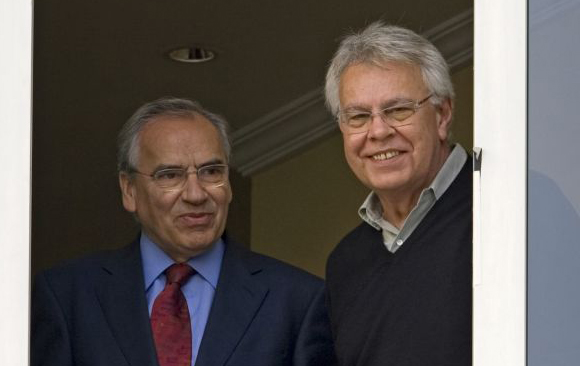

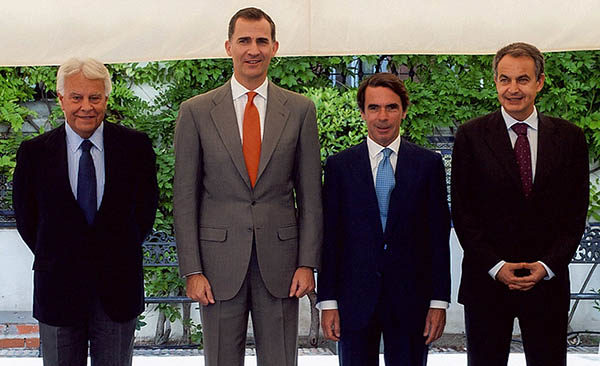
Since March 2016 González has held the José Bonifacio Ibero-American Chair at the University of São Paulo, Latin America´s biggest university. Created in 2013, the objective of this chair is to strengthen Ibero-American relations with the support of personalities from the worlds of culture, politics and economics.
In December 2013 the Felipe González Foundation was founded which since the end of 2016 has sought to make available to the public, all of the documentation held as well as organising and supporting activities and projects which contribute to equal opportunities and provide tools for society to meet the challenges of the 21st century.
Felipe González is a member of a variety of institutions and foundations either as an honorary member or as a patron, including the Jean Monnet Association, The Club of Rome, the Alternatives Foundation, the Royal Elcano Institute, the Barenboim – Said Foundation, the Montevideo Circle Foundation, the Ernest Lluch Foundation, the Tomas Meabe Foundation, the Editorial Board of the Prisa Group and the Jesús de Polanco Chair of Ibero-American Studies.
He has also been decorated with the Portuguese Gran Cruz de la Orden de Cristo, the Golden Gran Cruz of Merit from the Republic of Austria, the Madrid Medal of Honour, he is a Knight of the Collar of the Order of Isabella I of Castile and is a Chosen Son of Seville and of Andalusia in addition to having an honorary doctorate from the universities of Louvain, Toulouse and Tel-Aviv.
González has also published several books including Qué es. El Socialismo (1997), Memorias del Futuro. Reflexiones sobre el tiempo presente (2003), Mi idea de Europa (2010) and En busca de respuestas. El liderazgo en tiempo de crisis (2013).
At present his time is divided between conferences, attention to calls for advice and support from a range of countries – in particular in Europe and in Latin America – as well as working in his workshop and in the countryside
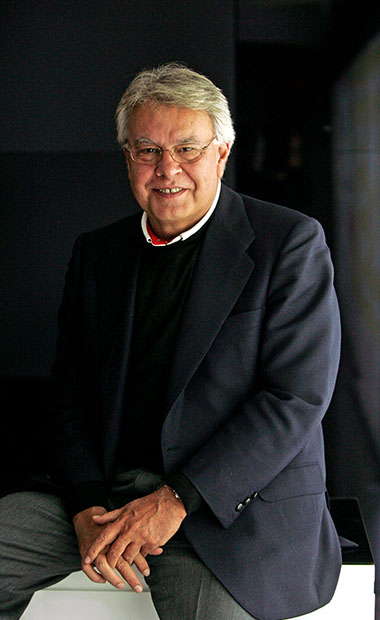
“It is possible to distinguish various types of politicians. Some have principles but have no ideas. Others have ideas but have no principles and there are many who have neither ideas nor principles. Finally, we need to work to identify those which have ideas and principles”.

Biography written on the basis of that written by Roberto Ortiz de Zárate, of the CIDOB Foundation, the information available on the PSOE web site (Historia del PSOE: Transición, Renovación y Gobierno (1977- 1996)) along with his own work.
